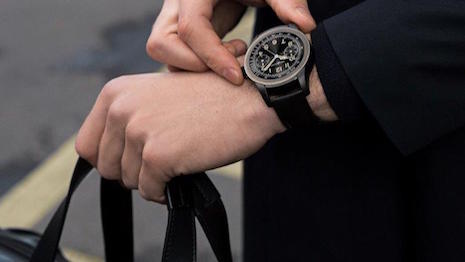Shipments of wearable devices are expected to almost double by 2021, as categories such as smartwatches take off.
According to projections from International Data Corporation, fitness bands will see slower growth over the next few years, while products such as smart clothing and watches will see sales accelerate. While hesitant at first, watchmakers are embracing hybrid or smartwatches as consumer cravings for technology and connectivity increase.
"The move from wristbands to watches introduces additional revenue opportunities for vendors and distributors as average selling prices are expected to rise," said Jitesh Ubrani senior research analyst for IDC Mobile Device Trackers.
"However, the struggle to move beyond health and fitness persists and convincing consumers to spend more for utility that may not be immediately obvious will be a challenge,” he said. “This is where fashion-forward brands have a chance to shine as their customer base doesn't tend to prioritize features."
Watching smartwatches
This year, Apple announced it had eclipsed Rolex as the top watch brand worldwide. The tech giant is leading the way in smart watch adoption.
While Apple has not shared specific sales data for its watch, the company did note in an earnings call on Nov. 2 that sales of the Apple Watch had increased by more than 50 percent year-over-year for three quarters running, per CNBC.
Overall, IDC expects that smartwatches will grow their shipments from 31.6 million this year to 71.5 million in 2021, for a compound annual growth rate of 22.7 percent.
Basic watches, or hybrid smartwatches, are projected to have a CAGR of 27.1 percent, growing total shipments to 78 million by 2021. With their analog appearance and connected features, these types of devices have been popular entry points into the smartwatch category for luxury brands (see story).

Michael Kors' Access smartwatch. Image credit: Michael Kors
For instance, Richemont-owned Montblanc demonstrated the ways in which fine watchmaking can meet the digital age with the release of its first smartwatch.
The Montblanc Summit combines traditional horology codes with the latest in wearable technology, an approach to smartwatch manufacturing that has generated success for a number of watchmakers. Although the smartwatch category has not overrun traditional timepieces, brands must show a willingness to embrace new technology, especially as the sector sees waning consumer interest (see story).
Smartwatches are set for growth, but connected clothing and earwear are poised for even faster increases, with respective CAGRs of 48.7 percent and 58.5 percent estimated through 2021.
"What will merit continued observation is how the market evolves beyond its current status and how users will either replace or append to their current devices," said Ramon T. Llamas, research manager for IDC's Wearables team.
"Tomorrow's wearables will become more fully featured and multi-functional, spanning health and fitness to communication and productivity,” he said. “Effectively, that will make today's wearables seem quaint, and spur upgrades and replacements."
{"ct":"Y6oksB3IEGpBQcWFRLsaOxk7z7C\/tqXmUs9WCS71ggzB50CWVKiUVAAxUKa96wLninrOYhdCuayiFr9ET7LUykA5hTfZzIA7VTJjv++q0\/d8I34+2CoE3K79w6rp7aVDeOcmQjcZ1pksoz+17tlULNsyF+5yz1699P46SsapH9BgvnwD8\/KvaRA+KD+2GWrWytg9kIhWa2s9tYFO1SBSEHKwlDwg6Mr3DXWUTFpVZLiLLMRSfTgUj2hOC5WZ74f9hytTZYkSa3edvQvVIROqEo4RzxuLWzT8NYVBsD+NDuwv5UdEzBiizKtWS8L5WcisMofVHPinf09YM4R5AZYMBK\/MIsihOWXlvleMA9CGqRCYNUDX\/AIC\/i1KRIq4YsNxwwBJ7FrB6Lsz9bjk4PudYkt\/4XRC+VtRRAktbkHYuj207O+xsg3cdRg8GjjcVa6WS+dPj3W93P6EUP4BEdXrNLPdGGIkvuWCf8DJsSpwQ3sDE4SnJYo0jesOvK8DjbXm4tXQUdVHAOftSGAJFe90w6U52L8YQBtf5+cFMLaOiH7XhYY94QXxwdnMxt0OUF\/spxDtrdV2zmxk38QznqKEQNlRFozhAdxJP9Dc+GeWMIzpeq9qh1v4nm+9eiHy1kdxHluelxrpO2l5fMQmCP4neKyhgF11ewmbINMXonWc0myrXPtmaicbTDjQ6TRy+PnrmcPiMC8KNVdRMtkEx5OCMTGdhtQ80\/Hw5QFKmx4WAoR6OeCsBUJJBVGnupDbjLPhvHGDHcCwA5\/GL1Z3a8IJ\/BAydzDA5tTdyCbwqn+tPMsFxxjELLvJw8bhAKvV+1YuvvCRQtLR4to8LR1lT7DoyfHaL92nAVSepTTzJG0fTbgtojTUwUW6Ru2w4zUqm79OSY\/0PPT+CO12QX9bCkXtI55ly0rFJW2xITfP0oh2O6DL3YyIFKbWWA20O9\/nQMiFOSrynpNqBX7\/iTakBsJsjRISdpIAgoNK8mlTGXFW+gO1VO0qc7IbsrDzeaTsPgSG+hspmJLohsumnWeLcbi2JcPXS48a1loF2etQyfbk636YovMdLVQgPk133F9F18O5i1MGbgkp7seTAQheX4U28emxlTPeH\/YYr7Qr1fDmMGB8uFIiwu6Zjw5wPQ3LmvCJOhS3WkkVuNee0W7jwcNK8ebBgVjClg7sxEk6Hj31Wc\/Fx+M6bxLLp7VHtKLyLdvcB4Y+qx3guHq\/tG2B9UYxeOEEh3Op0plE+H18Y3yrgNdpD6jRRumAIK3ckSCnwZw7MHcLdk2wuKUATmXt\/dqskzq\/cpiZXR6aB+jVRT0RP\/CRg4ADS5+kZ5vPGgI1FzoCCbZiUHF5aJ1ImJvYjCti8QDXBMF2apsGRDbPujDPbSA5WuIeZTVF0TBfjusyMU4Jb30HL7ZsZbx2sRmEcmYpIwGHTCcI8PabcUgqaOYNy42LNbJRNVirYIhCoAfJEW0wGa8oAJ0jwnqxTxQwu6zE8Eo5SpQoUQGU5x3uzs+KbvT8k03ttNalENiwG+Q11vF1T6Tr9NcjAZhhYL7SztLQtVOI4tVFb9Q10fZeNsQiphrMlbZxjL50ZlU2MzqWv+HfHc5gzA27CoUfaFGcm6M8BiuHgm09Ui1Z6xqs3eWenZGydJpYBd7LY7HFJgEBT+pQ8r8TyqPia4EzpAgOSvyzgSObSgfGFEGroDcy26SjlXdUmFWOqRjAoSkVsIh48jdjRq1R9Zl4rflboCDym\/Ji21D74f1ZVv54eOqu4sx8W\/0zZWa+ponp2TcaXKPlA4qvgzi8m4p771kRqzQtM3fA8RpLkvWXx9mzGIeoug9+1nK1PORsQQ1lnFX\/rL1umjGde\/lvAZtkduRKQJNom0gIaN0n\/bYSrIRlbsMB8l3xUQDnWc13CXmTFY+Ok+8wBI\/oj9eFVq0NdDgevbii92XQq5rsIrupmfbjtxyUm\/UINbMyvIc0GUZWnU03H5EvHJEz5AyhUanNS0h5yKppOjyunychKhLT4txCLcVavIkg4XJzYjhsxIdZumNIJWR+y44VttJmHFgp5RHkrecM9oikPpWWDTedG22QFM87pXeI7LwTLmvXtYkMgW+9wiSzLgVcaahlIvQeyp624HhCcC0Ok6oPGQPCUgARsQoatWGlDTOsufzsOZGCeMk4ZB2LJ6yjRBA2A5fYaUsxsENi1r17ni8v4ojs0xaChMP0vtWQqLoTYafOjl1mBYssI9Q1OL9MiGcKv7M5i9rFgSlAVhzZwfjuayXMuRRxPZ5kkubmVW1+DvCgDWZKaXjWiUkv2VPFi0ICIC5Kfg\/rKuxXxnI6E6tkQ1U2ycEhQ6zKnr58xEtVFr3XdpqGtfE+IO1YW7lQ6WQhqydGJRYtnHtYMFvD9Da+MHoz9iW291GTv\/mDxvK0jNAculLWV3DD9aL2RhVv2rMq7QI9e33ju9elz7huD1gj9lFYtx+h2pERytTdnIDXw7LlFQ2dwDyZgyJdqTjcvrOzbSNumSB4LpOMlvKcCsN4Ibl2A1GTwh01pJkb2gDaZLVG2qmZEp+\/Y7lv3ByEG9CS1TivkEYXWqvSPcNfL872LIN7ZqEr4MU9Bpa2Wd4RkuqWHRSH5BwZe85dgsyu5jPefNGF+DEAEiuCer7DdRMNt5UTAOssPqOORXMK2jTyTSYQt1w0Bb\/VJwpwK3R3ppYHU1kFm7DirR2horHQV4R8eJ\/jSxwOZSKmddR5nawhv6HtMHNTs5cgKb17eJoboBwACc5t\/Xe1vO+msJ0ZzAUNCrd1R0KeYkr4Ir23ZtFJpZpdrPsvf3+xddx7Xha7bwBXzhwBhbcN0v3ZxJGUepErFcFihVlIjoLEjAvcVCRg0kvpY\/VKIAzgPl4ImgK9wV52C5QEryPLgkQGHQ2utL0Gld3vx7MAk3OZTb09TiMvsSMKod\/Y9PLVTQyqIht1codkBwudJeErvuJIMlmEsYkvX6cuCoLs7vvWbLjcgVCmPrIF3Ha0on3EqBg+m0fTr60gmST2XfHF01fTJxFvpSWQpmgYkhCHMe3RRreF0w4fe\/PTRd+NbYFz4p4lBmw8euBtPt9GQLdIMxe7PI1Nfr4sUA8DRbwUzAaBFeX6eeTsA1Jf+n98Yt9LVMIcp4AKwwLT6z9iXT20xK2TsTvuLIrpL9JMAxBf2W3lzP3NXe1UEBOi9i3cYsLf0tf\/gsn2CoQUTeYlu0P9Ws3C\/UMJfO2uVesry5fiQboRxE4ebcJ3JFHG7BRQ9790GWWudO+lqfzweewBa4z84febky+X1SzxEGqIXvqVJ8S7gw4VnUU9hLnJdYgpxxtB0XWUiyavXfjyBFTKwNL58gUVD0CKRDJ8Fd5ERwyJ\/csuhdZqzgETD+vXuOXrFRmnP27oVASbhkcbIlhPlJxyYIk59g9eHw0OfcbTX9TkR\/+7GEFqQUgxgQ+1hyF76Q+xIkIdYpxic0wu2Q6ni6azeM8rFTkx5eHxIWuGwuAmdv+EdALhHN8MXW4BE5MCsRtoEV72rlVNZABi2pUgJ4FUUbmDwrxJNtZ8M7h8fjFjt48Dgx3X54QYgivpO04yjYtciDKl9ll9fTqwNdarHogqn+UVkfqsKy80YfijB04\/7kKl5K90ZKiR5xQktVSYPFCjlXlklWPDiz09frYifb2HQ0Vmp4bJ93P3x+jEFkvlFmZBGWf4O6f72bmTd5s7j8oBqqYXRUGiOlSK3E9Hap7TMP9s54ZszF4U\/LH13KisHe\/cv6Gxt3f\/6g1YSSKd72rgISbvwkJNeRXLGE3qlNXJtyVqCTM+ztDYCMRkmm\/gzHMKZ+Lp4hIKAqTapVHc06pRADlfhEwa+IMWxOftB\/IKU18xXFu5frhONtss+cmagMQYBHUDD8qTVQwhz8CbdEOgkadGlWB8ZwVk4ckKDko1tY+cpkfnDjoxsTyZw6CZkucKHw25cc9jrM9ei0lQ4bTrMD7PlbnUae2g+D9bfHPmtSCIfq04L9MSkTK5TFM01IUFa3VyG7EvEVHc+P2sizT86ZGw4AjP4R6yMo4XknE7DHO8ocWQuFHPeFhnQNfB+\/t3a0xPe6GcOh5lAwKvhKn1FgHa5Vy8h69\/M\/dwpQ9guBSKsXi\/KCG9IjjFd07631hCvsjN+p2+u2lhEUgU08a73h4I5PE4R7XCjT\/ehaTuOJ+8vpkBF70MxKKXANTVX\/StGj5T+3ia\/ZBOapMlCKoeooutZRoan9M9xWKJeo7P+3W20PI95swAGGrZ6NI\/VrvhXr7ol6JDa+VYi3cngsPu4a0Mu0HMIfrNdGeRpBDGKtMtJ7Z2CJN9pPmCv+ppCOInea5bU0fO9hjcjX3f5N\/5sVnyEtebB0SyhhXbkSJE3Psag1858utKP9MciS65HCqO9CYcp\/XhiKAsEqp+8x9cH\/Ulfp2gOsLLkPNsjjC2WvLGwzhDapFseOthyelnLMcMhJiDeGgJNHnFxXCisDboHqHgZBNNEhpOOB6pE3KVB7j09LDpf7C7jZgwl8S6PNBdyYq3pTzvEC2dhKsvFnHJNHr4ZIiwlV\/Bt\/q+ez4WPnJdD\/hJB0Btn5YaiA8Qjq3UFmzs4RY1HBp39NRvnke58kyhDXKzKZpxEXfG4co7AUrxvCMlLNVgjndNVn42DCKZ840S8rxg2\/\/Q9uaLw4MiZ5KNSjruR5zV3qoBLKpvzUgOixLdZVRY3NvWoA+Olzy9a+MJg2rUtZ5eh2ifNgksP7GufbWAQqUqaBVxNcilVr4xv6\/eEVdwQuwaXv82W+q4Ty1CqP4+ZSbNsdcra3G3mmMtfuqnj4XQVKNHc5bs7+3FFLcJdjL2PHJwpRUAJZyoQUGU8\/K+55SK31+at9FBCnaHovklsAKDn8g3M+D3pgjNZCDDFj2X7FoJ+AjK10NlH4YKaoLWEFR3+bsYiAShRV6b4uMxnj4pl2Ff8z2tVPthoWkmC9DI5D6bjTFfYf70sCCW1g7ZXISiDd0jwRoTOXtY94svwQGN32gcWtPJGfBuWHQvA4XFDU0+Q26IRwJFnW1dMsBHO7bynuTEsHCPW9\/HIjV7ba+ZFIS0Z254DxC0VXMQuY+Sxy6Pvpm6lB5iS8KaTTAbH7zPbNd6TYBQowxzlVw6AOMKQJoqwbn7ei3gl8TU969XXXGbkscGncirxFrQrO1dwILKGgnM1STv1QQg29EWio5Ku1IQlSbUIhnoR+R1wDF\/MPqA5RjSLfKSm56JcoldzwuE6v8tvg6Lr24E3zCoNjEYCE4E9O+W9PD0UMCuag==","iv":"669dd43a78b38a9cbd4aa851bd16f80c","s":"b90658139cd8c371"}

 The Montblanc Summit smartwatch
The Montblanc Summit smartwatch